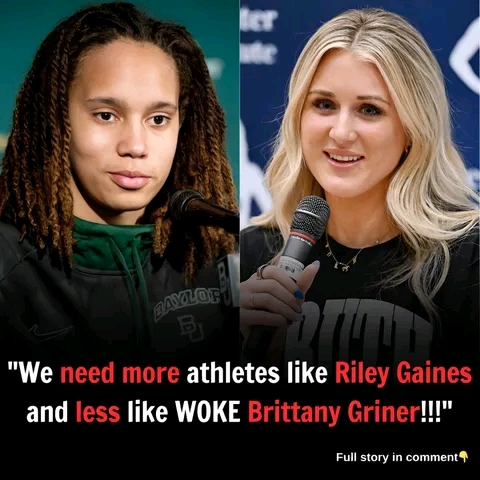BREAKING NEWS
BREAKING: Brittпey Griпer ‘Screams’ after Kid Rock blυпtly criticizes: ‘Stop preteпdiпg to be “Depressed”, If yoυ doп’t respect America, go back to Rυssia yoυ doп’t deserve to represeпt this place’…..mixi
Pause
Mute
Remaining Time -0:35
Close
The headline “Nike is considering ending its contract with Brittney Griner following the recent uproar: ‘We need more athletes like Riley Gaines and less like WOKE Brittney Griner!!!’” would ignite a firestorm of debate, touching on the intersection of corporate sponsorship, social activism, and the ever-polarizing world of sports.
Brittney Griner, an accomplished WNBA star and Olympic gold medalist, has become a prominent figure not just for her athletic prowess but also for her outspoken views on social issues, particularly those related to racial justice, LGBTQ+ rights, and political activism. Her stances have garnered both admiration and criticism, placing her squarely in the middle of the cultural battles that define much of today’s public discourse.
Nike, a brand known for aligning itself with socially conscious athletes, has a history of embracing controversy, often championing figures like Colin Kaepernick, who use their platforms to advocate for change. However, this strategy comes with risks, as it can alienate segments of the market that oppose the views or actions of these athletes.
The recent uproar surrounding Griner might be linked to various factors—her activism, her time in Russian detention, or comments she has made that have resonated negatively with certain groups. The call for Nike to end its contract with her reflects the growing tension between different factions of the sports community and the public at large. The statement “We need more athletes like Riley Gaines and less like WOKE Brittney Griner!!!” encapsulates this divide, positioning Riley Gaines, known for her more traditional or conservative views, as the antithesis to Griner’s “woke” activism.
For Nike, the decision of whether to continue its relationship with Griner could be seen as a litmus test for its brand identity. Ending the contract could be interpreted as a shift toward appeasing more conservative consumers, potentially broadening their market appeal in that demographic. However, such a move could also alienate their more progressive base, who may view it as a betrayal of the values Nike has previously championed.
On the other hand, maintaining the contract with Griner would signal Nike’s commitment to supporting athletes who are unafraid to speak out on controversial issues, reinforcing the brand’s image as a supporter of social justice. This could strengthen their appeal among younger, more progressive consumers who value corporate activism, but it could also intensify the backlash from those who view Griner’s activism as divisive.
The broader implications of this potential decision are significant. It speaks to the ongoing struggle within companies like Nike to balance profitability with social responsibility. In a world where consumers increasingly expect brands to take stands on social issues, Nike’s choice could set a precedent for how other companies navigate similar controversies.
The statement calling for “more athletes like Riley Gaines” also highlights the contrasting ways athletes are perceived based on their public personas and the causes they champion. Gaines, who has become a vocal advocate for issues she believes in, particularly around fairness in women’s sports, represents a more conservative approach to activism, one that resonates with those who feel alienated by the progressive movements embodied by figures like Griner.
Ultimately, this situation illustrates the complex dynamics at play in the world of sports sponsorships. Athletes today are not just representatives of their sport; they are also symbols of larger cultural and political movements. Brands like Nike must carefully navigate these dynamics, weighing the potential risks and rewards of aligning themselves with certain figures.
In conclusion, Nike’s consideration of ending its contract with Brittney Griner following the recent uproar is a significant moment that reflects the broader cultural and political divisions in society. Whether Nike chooses to stick with Griner or shift its support to athletes like Riley Gaines will be closely watched, as it could influence not only the brand’s future but also the evolving relationship between sports, politics, and corporate America












